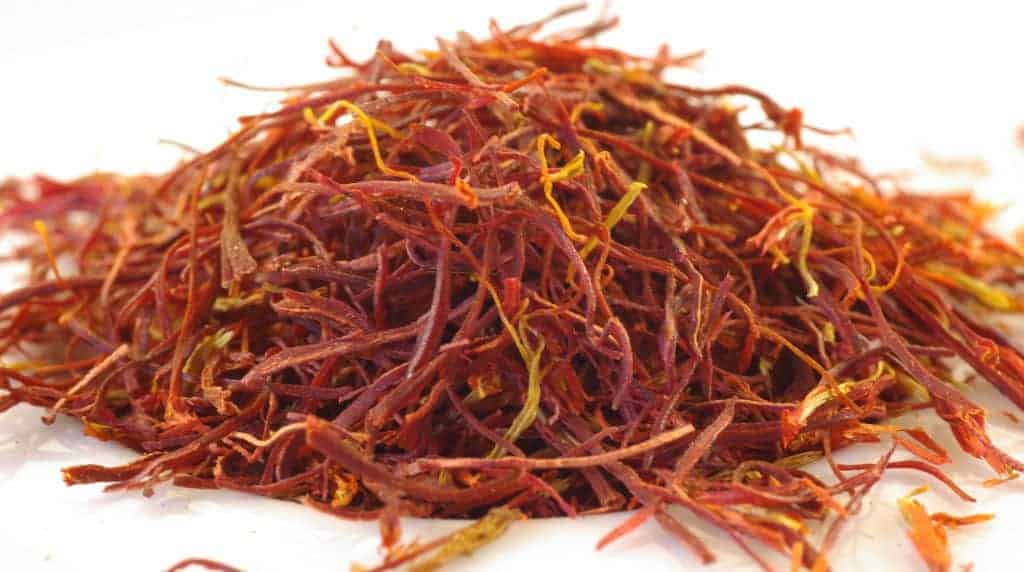Numerous studies indicate positive results for the use of saffron for depression and anxiety disorders. Around the world today, as many as 1 in 10 people currently suffer from debilitating mood-altering conditions. Traditional prescription medications may not be effective for everyone and can cause undesirable side effects for others. And so it’s important to look for safer, holistic and natural treatment options.
The statistics are not surprising in a world where success and personal performance are forever used to judge individual worth. Depression is a natural byproduct of our attempts to appear acceptable in the eyes of others. Sometimes it is necessary to take a step back and consider how to care for yourself. Take a break. Rest. Admit that everything is not wonderful in your life, and be yourself.
There are some creative dietary solutions to help you stay relaxed and able to take on daily challenges. Ongoing studies have revealed the efficacy of a variety of herbs and spices for brightening your mood and adding variety to your diet. The effectiveness of saffron for health and emotional wholeness has been confirmed by recent studies around the world.
So just how beneficial is saffron for depression? Is it worth the price tag? This product of Mediterranean origins has long been a natural herbal treatment for mood disorders, PMS symptoms, and even weight loss. As part of a healthy diet and exercise regimen, the spice can be effective for improving overall brain function, including mood and memory.[1]
Saffron for Depression
Depression manifests itself in many ways. If you suffer from this debilitating disorder, your own internal coping mechanism may be completely different from an acquaintance who also struggles. Some of the most common and easily recognized symptoms include:
- Lack of motivation
- Withdrawal from normal activities, especially social ones
- Inability to concentrate
- Disruptions in sleep patterns
- Eating disorders
- Self-neglect or even self-harm
These and other depression symptoms may make facing each day a difficult task. Studies have shown saffron to be an effective antidepressant in mild to moderate cases. Chemicals contained in the herb increase serotonin levels in the brain, thus improving overall mood and motivation.[2][3]
Saffron and Anxiety Issues in Teenagers
For growing teenagers, natural alternatives such as saffron for health and emotional support are especially welcome. Depression and anxiety issues are considered among the top disabilities of teenagers. If your teenager suffers from symptoms of moderate depression, try adding a few threads of saffron to drinks or meals each day. Supplements are also available and highly effective in pill form.
Separation anxiety, depression, and other social issues in teenagers have been successfully treated with regular saffron consumption. In several studies, a 30 mg supplement was taken twice a day for best results.[4]
Conventional medications with Saphron for Depression
For more severe cases, saffron has been shown to increase the effectiveness of conventional medications while helping to mitigate undesirable side effects. These side effects include erectile dysfunction for men and worsened PMS symptoms for women.
Saffron has been used traditionally as an aphrodisiac for centuries. As a supplement to prescription meds, it may counteract the way symptoms of depression can disrupt the physical relationship of couples. Studies have found the spice to be helpful in restoring more relaxing and fulfilling relationships.
Keep in mind that saffron could cause negative effects, even poisoning if taken in large amounts. Follow recommended dosages and watch for any possible allergic reaction when trying any new herbal supplement. Saffron is generally safe and positively effects most people, but it is not a cure-all so don’t overdo it.
Antioxidants Promote Saffron for Health
Crocin and crocetin are two of the antioxidants responsible for saffron’s crimson color. Studies indicate that both of these compounds may relieve depression. They may also protect brains cells along with being anti-inflammatory.
Studies are ongoing to learn how effective this traditional remedy may be for related conditions such as obsessive-compulsive disorders, which are usually treated with the same types of medications. Some researchers hold high hopes for the results of these studies, as mood enhancement and brain function seem to go hand in hand for these types of health issues. If you feel better, you tend to think more clearly and rationally.
Saffron’s ability to brighten your mood has earned it the nickname “sunshine spice.” Of course, saffron is well known in the culinary world for its taste and aroma. These qualities are due in part to another antioxidant, safranal, which is also believed to enhance mood as well as increase mental function and memory and decrease oxidative stress in brain cells.
Saffron for Depression Caused by PMS
As previously mentioned, saffron can provide practical and efficient relief for PMS symptoms. This includes physical, emotional, and psychological symptoms. Along with alleviating anxiety, saffron can help relieve headaches, cramping, irritability, and even lessen food cravings.
If you decide to try saffron to relieve PMS symptoms, you can try a supplement in pill form, or steep just 1-3 threads per cup of water along with ginger and cinnamon or honey and drink as a tea. Saffron is the most expensive spice in the world, but it takes only a small amount to enjoy its many benefits.
Saffron and Weight Loss
The B vitamins and antioxidants found in this ancient spice are reason enough to use saffron for mental health reasons. But studies have shown that along with the benefits of saffron for depression and anxiety, the spice also has an effect on appetite that can lead to weight loss.
It may simply be that a person who is in a good mood is less likely to snack. Studies have shown that women who took a saffron supplement felt less hungry and were less inclined to munch between meals. So the profit of the herb goes beyond just feeling less anxious. Consistent use can lead to changes in unhealthy eating habits and food dependence over time.
Saffron for Health Beyond Depression
It seems only right to mention some of the other health benefits attributed to this easy-to-use, flavorful spice. Although saffron has been used for centuries as a mood enhancer and for other obvious symptoms such as PMS, there are also internal applications that are just beginning to be studied.
Some of these benefits include a decreased risk of heart disease and high blood pressure, lower blood sugar levels, and improved memory. Studies are revealing a positive impact on age-related macular degeneration and eye health in general, as saffron appears to protect against free-radical damage in the eyes. Also, more study is in the works to determine its full potential effects for Alzheimer’s sufferers and cancer patients.
Saffron’s anti-inflammatory properties also make it a boon for arthritis sufferers. The spice helps to relieve pain by relieving pressure on the joints for both osteoarthritis and rheumatoid arthritis. Less inflammation may also mean less joint damage over time.
How to Add Saffron to Your Diet
Saffron can be purchased as threads or powder. Threads are recommended because it’s easier to see the quality and purity of the product. Since saffron is such an expensive spice, you’ll want to make sure you’re getting your money’s worth.
Saffron has long been popular for savory dishes and rice. Saffron may be added directly to a dish or soaked beforehand to draw out its pungent flavor. Be careful not to add too much, as the pervasive flavor can be overwhelming.
Saffron rice adds variety to meals as a side dish. Saffron tea is a flavorful way to ensure you’re getting your daily dose if you’re using the spice medicinally. Or try some Swedish Saffron Buns. Recipes can be found online for main dishes, side dishes, drinks, and even desserts.
Do a bit of research before purchasing a supplement in pill form. Make sure you’re getting the best quality and check out the dosages. Purchasing high-quality, proven products will mean a more satisfying outcome with committed use. However it’s taken, using saffron for health and healing is a long-standing, trusted tradition.
Final thoughts
Remember that as often as not no one change in diet or medication can completely solve your depression or anxiety problems. It’s important to speak with your physician about contributing issues such as disturbed sleep patterns, job or relationship stress, and the proper amount of physical activity.
Using saffron for depression is an ancient, traditional remedy that may be able to alleviate symptoms on its own or in conjunction with other medications. If you are already taking prescription drugs, talk to your doctor before making major changes. If prescription medications don’t seem to agree with you, saffron may be one alternative to look into.
There are many natural treatments for depression, so don’t be discouraged if one doesn’t work for you. You may try a variety of combinations of supplements and creative recipes that will keep you from being bored with any one treatment. Just learning the wide variety of medicial spices is a challenge in itself. However, improving your mood may be as easy as adding a little spice to your life. So don’t hesitate to give it a try.


















